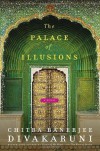The Activists’ Handbook: A step-by-step guide to participatory democracy
 I think the ideal reader for this book would be just starting to get involved in some sort of activism, either a starting a cause or joining an established one. It gives just the kind of high-level orientation they probably need. Warning: it isn't more than a high-level orientation and won't tell you everything you need to do!
I think the ideal reader for this book would be just starting to get involved in some sort of activism, either a starting a cause or joining an established one. It gives just the kind of high-level orientation they probably need. Warning: it isn't more than a high-level orientation and won't tell you everything you need to do!If the reader is more experienced, the nitty-gritty practical details are probably going to seem too general, too vague, or too incomplete. The book tried to address an international readership and all varieties of activism. Experienced activists probably (hopefully) already have a good grasp of specific laws and strategies that apply to them. On the other hand, I kept wanting to share this book with some of my activist friends because the author is brilliant at dissecting the philosophical and conceptual issues which seem to keep giving them grief.
I'm not officially involved in any activist movement (yet, who knows?) so I was reading for general interest. That made a few chapters seem a bit dry, but overall, the conceptual and analytical clarity made it interesting and informative.
I Shall Wear Midnight
 A lot of this book is about Tiffany struggling with situations she is really too young and inexperienced to cope with, which is an inevitable part of the plot and the world she lives in. The first incident is the most shocking and I wouldn't be surprised if some of the readers were too young and inexperienced for it as well. I don't think my 13-year old would be happy, she's reading these books for the little blue guys. Even Pratchett doesn't really seem to know where to go with something that horrible. I think it was a mistake - if anything, he should have built up to it more slowly. Or else stuck with that level throughout the whole book, and gone for the more mature readers only. Because what's odd is that the story settles down after that incident and becomes much more manageable, even fun. A typical Tiffany book in which she trounces the forces of evil and impresses the older witches.
A lot of this book is about Tiffany struggling with situations she is really too young and inexperienced to cope with, which is an inevitable part of the plot and the world she lives in. The first incident is the most shocking and I wouldn't be surprised if some of the readers were too young and inexperienced for it as well. I don't think my 13-year old would be happy, she's reading these books for the little blue guys. Even Pratchett doesn't really seem to know where to go with something that horrible. I think it was a mistake - if anything, he should have built up to it more slowly. Or else stuck with that level throughout the whole book, and gone for the more mature readers only. Because what's odd is that the story settles down after that incident and becomes much more manageable, even fun. A typical Tiffany book in which she trounces the forces of evil and impresses the older witches.
A Hat Full of Sky
 I think this may well be my favorite of the four Tiffany Aching books. If I had to say why... perhaps it's because it has a bit of everything - the chalk and the mountains, the witches and the Feegles, everyday life and deep magic. Or perhaps it's because it's all about boundaries - between all those things and also the edges where the self stops being the self. And it does all that while staying light enough for young children to enjoy. In fact I think it's a nicer read for kids than the first book, which gets a bit metaphysical at times.
I think this may well be my favorite of the four Tiffany Aching books. If I had to say why... perhaps it's because it has a bit of everything - the chalk and the mountains, the witches and the Feegles, everyday life and deep magic. Or perhaps it's because it's all about boundaries - between all those things and also the edges where the self stops being the self. And it does all that while staying light enough for young children to enjoy. In fact I think it's a nicer read for kids than the first book, which gets a bit metaphysical at times.
Jude in London
 I picked this book up in the library and after the first couple of chapters I decided it was going to be rather like spending a pleasant evening in the pub. So I thought I might as well make a night of it, perhaps even go clubbing afterwards, and that was that. I finished the thing round about 4am.
I picked this book up in the library and after the first couple of chapters I decided it was going to be rather like spending a pleasant evening in the pub. So I thought I might as well make a night of it, perhaps even go clubbing afterwards, and that was that. I finished the thing round about 4am.There were definitely moments during that night when someone - I think it was Jude the narrator - had a few too many and suffered various lapses of political correctness and bouts of Too-Much-Information syndrome. He didn't always keep the best company either, some of his pals are intolerable scumbags. And I'm sure the drinks got spiked at some point, because that's the only explanation I can find for some of the weirder hallucinatory moments. Notwithstanding, we certainly set the world to rights, at least those parts of the world that have to do with economics, cosmology, art and literature. There were some sublime moments as well, and Jude got laid of course... although I didn't - apparently a partner who spends all night reading with the lights on is unappealing, or so I've been told.
Funny thing is, I didn't have a headache at all in the morning. In fact I felt utterly unchanged - which seems less than you should expect to feel when you've spent the night setting the world to rights. You could argue that because of that, Jude in London really only deserves 4 stars. It was a laugh though, and I'd certainly read the other books in the series at some point, so I gave it 5.
The Gospel of Loki
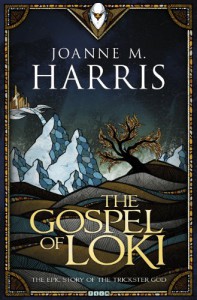 This is the latest of several books I've read with my daughter (aged 13), so I'm going to review it from that perspective.
This is the latest of several books I've read with my daughter (aged 13), so I'm going to review it from that perspective. First off, she loved Loki! Well, I did too, of course, but I've been around a bit and I've met bad boys before. I was impressed with the way Joanne Harris created him: his voice, the way his character comes out in his self-justifications, his criticisms of others and even his sensual enjoyment of a world he was never originally meant to live in. Incidentally, for those who are wondering, the content of this basically adult novel was pitched just right for someone at my daughter's development stage, which is: willing to entertain the fact that sex happens, but undesirous of hearing too many details. Also, luuurrve is much, much yuckier even than sex - on that subject she was in total agreement with Loki and enjoyed the consistent validation he gave to her opinion.
Meanwhile, I was pleased... well, over the moon really, to see her getting her fix of Norse mythology from a book that stuck pretty closely to the original plot-line and I enjoyed reading it all over again myself.
The single, solitary thing I didn't enjoy about reading this book wasn't the fault of the book at all. It was due to our lovely system of collective education which somehow manages to keep children so busy doing something that they hardly have time to read. Because of this, it took us weeks to get through this book - literally from the end of August to early January!! I would certainly have gobbled it down in a couple of readings, but the one thing I will say is that neither of us got bored, neither of us gave up, and we both leaped at the chance of picking it up again whenever possible. And on the other hand, I didn't cave in and finish it while she wasn't looking. That kind of tells you where the book stands on addictiveness level.
Oh, and the ending, literally the last few words, is really cool, but I'm not giving any spoilers on that one.
The Girl Who Saved the King of Sweden
 I really liked the film of [b:The Hundred-Year-Old Man Who Climbed Out of the Window and Disappeared|18308098|The Hundred-Year-Old Man Who Climbed Out of the Window and Disappeared|Jonas Jonasson|https://d.gr-assets.com/books/1376250592s/18308098.jpg|10365993] so I decided to give this a try. It's easy to see the similarities between the two: a sweeping historical backdrop, an unusual main character and a complicated plot that's structured rather like that arrangement of pipes on the cover, only more so. Since I was new to the actual writing, I couldn't feel jaded about it.
I really liked the film of [b:The Hundred-Year-Old Man Who Climbed Out of the Window and Disappeared|18308098|The Hundred-Year-Old Man Who Climbed Out of the Window and Disappeared|Jonas Jonasson|https://d.gr-assets.com/books/1376250592s/18308098.jpg|10365993] so I decided to give this a try. It's easy to see the similarities between the two: a sweeping historical backdrop, an unusual main character and a complicated plot that's structured rather like that arrangement of pipes on the cover, only more so. Since I was new to the actual writing, I couldn't feel jaded about it.I really loved Nombeko as a character. I even got over my disappointment that she was only really a girl for the first few chapters, although I kept hoping that maybe her daughter... I don't know, I just expected that contrast between the very old guy of the first book and a very young one in the second. It's maybe true that Nombeko's character arc fizzled out a bit towards the end. Or maybe it was the fault of Holger One and Celestine as you might expect. They had really expended the full depths of their stupidity before the end, so perhaps they should have been ruthlessly evacuated from the stage to make way for fresh meat.
I read a lot of fantasy, and The Girl Who Saved the King of Sweden isn't that, but it's so fantastical it hardly matters. In fact, one of the things it does is raise the question of where exactly the historically accurate bits break off and imagination sets in. It's also written in an expository style which isn't officially well thought of in English writing but seems to filter through in translations from Scandinavia and Germany quite often. Never mind all that 'show don't tell' stuff, when it's done well, I like it.
The 100 Thing Challenge: How I Got Rid of Almost Everything, Remade My Life, and Regained My Soul
 You really don't need to read this book to do a 100 Thing Challenge. I picked up on the idea as an Internet meme about 5 years ago, then spent two years traveling with rather less than 100 things in tow. That's the easy way to do it, of course, but I hate having too much stuff anyway.
You really don't need to read this book to do a 100 Thing Challenge. I picked up on the idea as an Internet meme about 5 years ago, then spent two years traveling with rather less than 100 things in tow. That's the easy way to do it, of course, but I hate having too much stuff anyway.So does the book have any value add for those who already know how to count things? It's very much about Dave Bruno's personal experiences with the challenge after he originated it - and not really a how-to, for those who need help decluttering. It's modest and undramatic, but a pleasant and easy read. In his shoes, I would have had so much to say about owning stuff, historically and culturally, which he didn't say and perhaps doesn't know. I do think the book could have been more, but such as it is, it amused me.
The Autobiography of Benjamin Franklin
 Hmmm... it's the sort of book where everyone's heard what's in it, even before they read it. I actually found the third section most interesting, for the description of how to make public life and institutions happen in early Philadelphia.
Hmmm... it's the sort of book where everyone's heard what's in it, even before they read it. I actually found the third section most interesting, for the description of how to make public life and institutions happen in early Philadelphia.
Confucius, the Analects: The Path of the Sage--Selections Annotated & Explained (Skylight Illuminations)
 After trying to read Confucius 'raw' I realized I needed a little help and orientation. This hit the spot and I now feel much more able to tackle the Analects for my own purposes. What I found most helpful?
After trying to read Confucius 'raw' I realized I needed a little help and orientation. This hit the spot and I now feel much more able to tackle the Analects for my own purposes. What I found most helpful?1) The little bit of context in the introduction about Confucius' aims, his career, and how the Analects were put together, particularly the insight that they're not trying to have a structure.
2) Relatively detailed guides to the historical context behind selected sayings. Although it still won't help me understand all the rest, it turned a morass of obscurity into situation where I can at least be clear on what I don't know and get Confucius' overall drift.
3) One reader (Rodney Taylor's) model of how to approach Confucius: by sorting the sayings by topic of interest, interpreting and comparing them.
A little note on expectations: First of all, this isn't a complete or in depth guide to Confucius and only covers a selection of sayings. I was using it as a preliminary to going back to the full text, but you could use it as a simple 'what's this all about' kind of book to read in half a day. Secondly, both the publication series and the author are motivated by a religious worldview I don't share. This isn't a criticism as such, and I'm in no doubt at all about the author's academic credentials, even though this is an easy book for everyone. Probably, those American Christians who want to read ancient Chinese texts will feel right at home! But that worldview strongly motivated some of the emphasis and direction of the book, sometimes to the point of harping on points that really make no difference to me either way: the difference between a classic and a scripture, and the category into which Confucius should fall??
Still, as I was trying to say above, I looked on the book more as an example for what I might try to do myself, so it was interesting and helpful to watch Taylor go through the process with a lot more historical and linguistic knowledge than I will have.
Mindful London
 It's a cute idea but I suppose it wasn't really for me because I'm already perfectly calm and contented with London's state of chaos. Actually, reading about all the ways in which London might be stressing me out stressed me out more than London does.
It's a cute idea but I suppose it wasn't really for me because I'm already perfectly calm and contented with London's state of chaos. Actually, reading about all the ways in which London might be stressing me out stressed me out more than London does.
The Fifth Elephant
 I read The Fifth Elephant again because I needed to relax.
I read The Fifth Elephant again because I needed to relax.I wonder if it's even worth saying anything about a book that already has 30,000+ reviews? Just this perhaps. What makes Terry Pratchett at his best a fantastic author? Lot's of things, but have you notice his gift for rhetoric? He spends half of his books putting ideas across and he does it brilliantly and even if you notice at all, it's still a book you can't put down.
The Stars Change
 I've been trying to decide whether The Stars Change is erotica with a science fiction backdrop or a science fiction story in which the characters manage to tear themselves away from their busy sex lives in order to save their city from interplanetary terrorism.
I've been trying to decide whether The Stars Change is erotica with a science fiction backdrop or a science fiction story in which the characters manage to tear themselves away from their busy sex lives in order to save their city from interplanetary terrorism.I'm angling towards the latter because characters in erotica tend to lack humanity and these ones don't, so much. Actually, humanity is a loaded world in terms of The Stars Change, because it's set in a multicultural world, replete with tensions (and sexual engagements) between humans, modified humans and aliens, but I don't have a better one. If we ever get there, this will obviously be a problem ;)
I wouldn't say this book changed my life or anything, but I enjoyed reading it. Other readers may like to know that IMO the erotic aspects are rather oriented towards those who are attracted to women, but sensitively enough done not to put the rest of us off. Also the world on this distant future planet was founded by humans from the Indian sub-continent and has retained and modified Indian tradition in all sorts of interesting ways.(
Toby Alone
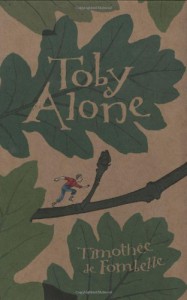 The world building idea of the tree as continent with a complex society of people inhabiting it is cute. The plot and characters are fun. The structure perturbed me a bit - I didn't like the parallel narrative, where we follow Toby's escape, interspersed with flashbacks of his life, throughout the whole novel. Which is interesting news to me, because I'd been thinking of trying it myself.
The world building idea of the tree as continent with a complex society of people inhabiting it is cute. The plot and characters are fun. The structure perturbed me a bit - I didn't like the parallel narrative, where we follow Toby's escape, interspersed with flashbacks of his life, throughout the whole novel. Which is interesting news to me, because I'd been thinking of trying it myself.
Gods Without Men
 This was so beautifully written and so intense to read, I had to take it in very small stages, but maybe a lot of that depended on personal experience. I know the area where the book is set, I know about intercultural relationships under stress (ouch!), I even know some autistic kids. I've been trying to think how it works to people who don't have those connections with the subject matter.
This was so beautifully written and so intense to read, I had to take it in very small stages, but maybe a lot of that depended on personal experience. I know the area where the book is set, I know about intercultural relationships under stress (ouch!), I even know some autistic kids. I've been trying to think how it works to people who don't have those connections with the subject matter.I was okay with the alternation between the main story thread and other historical bits though I can imagine some readers not liking it. I think it is a bit frustrating that the book never really commits itself to a viewpoint on whether there is something supernatural going on at the pinnacles or whether it's just 'people' and coincidences. Especially after what happened with Raj - I share Jaz's views on that! The book forces you to make your own hypotheses, with no possibility of knowing whether you're right. But I didn't mind that too much, especially because I think it's part of the author's point.
I certainly agree that the openness of the ending is very frustrating. The spoiler below basically tells you the ending, then tells you why you won't like it, so click if you really want.
I could accept Jaz's disorientation and the fact that the story isn't really finished, maybe will never finish. I was fine with that. What disturbed me was the literal cliff-hanger - because to me, the novel ended with the protagonists' stranded in the desert, where I think their lives at risk (ugh, been there, done that too!) and I keep asking myself 'did I miss something? Is the thing that will happen next supposed to be obvious and I didn't get it?' And also, this isn't the kind of story where their death would be consistent, but actually, what would be consistent? Kunzru, if I ever get my hands on you, you will get such an interrogation!!
It is very, very well written though. I guess I gave it five stars because I have a very high tolerance for authors causing me pain and frustration, provided they write beautifully.
Satan's Guide to the Bible: 1 Satan, Hitch and Snikwad Face Their Demons
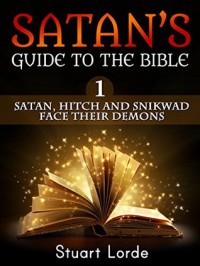 This is the free, two chapter preview for a series I'll definitely be checking out. Poor old Satan is up to his horns in trouble. Not only does nobody believe in him any more but it turns out he was never official in the first place. Come to think of it, who was? Surely not Anyanwu, the Igbo sun goddess who is the only God with a capital G available to pick up the crystal ball and deal with his problems, and who has just ordered him to read every version of the Bible he can find, or else.
This is the free, two chapter preview for a series I'll definitely be checking out. Poor old Satan is up to his horns in trouble. Not only does nobody believe in him any more but it turns out he was never official in the first place. Come to think of it, who was? Surely not Anyanwu, the Igbo sun goddess who is the only God with a capital G available to pick up the crystal ball and deal with his problems, and who has just ordered him to read every version of the Bible he can find, or else. As you've probably guessed, there's a didactic aim behind this book so it packs a lot of information and ideas into its plot, mostly courtesy of the erudite but sycophantic hench-goblin Hitch. It's a bit early to comment on the content yet, but the format is working for me so far. I always did have a soft spot for demon-based education (cf.[b:The Number Devil: A Mathematical Adventure|91358|The Number Devil A Mathematical Adventure|Hans Magnus Enzensberger|https://d.gr-assets.com/books/1316739099s/91358.jpg|1021311]). Satan's Guide has got ambition, humor and nice illustrations.
I'll probably try the next one tomorrow, amongst other things I'm interested in seeing what the lower age limit for this book will turn out to be.
Emil and the Detectives
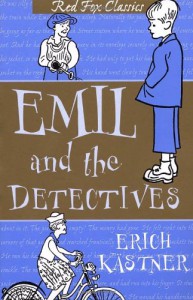 I'd expected a slightly higher reading age. Emil was fun but I should have tried to plough through it in German for a bit of a challenge.
I'd expected a slightly higher reading age. Emil was fun but I should have tried to plough through it in German for a bit of a challenge.

